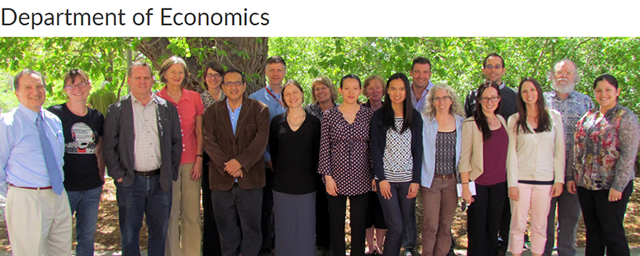
Economics ETDs
Publication Date
Spring 4-15-2019
Abstract
This dissertation presents a collection of essays that study ways in which human mobility affects economic development in origin countries. It focuses on Latin America—a region historically connected to episodes of large-scale migration, recipient of significant remittance flows, and victim of sluggish economic growth. The first two chapters examine the effects of return migration from the United States on aggregate economic welfare and non-state violence in communities of origin in Mexico. The analysis is motivated by the historic reversal in the Mexico-U.S. migration flows in the early 2000s. The third chapter analyzes the interaction between remittances, migration, and secondary school enrollment.
The first chapter explores the impact of return migration on the economic development of communities of origin using data from Mexico. The analysis exploits the exogenous variation in return migration rates due to exposure to immigration enforcement in the United States and geographical distance to the border. Using a novel dataset compiled with information from both sides of the border and spanning over a decade, the study finds that increased rates of return migration leads to higher levels of development via improved labor, wealth, and education outcomes. The empirical results suggest that the benefits of migration may extend beyond individuals' tenure in host countries, as savings, human capital, entrepreneurial initiative, and social norms acquired abroad have the potential to contribute to economic development back home.
Chapter two examines the relationship between return migration and non-state violence. Existing literature shows that immigration to the United States reduces crime through urban renewal, social cohesion, and the revitalization of marginalized communities. Existing evidence showing that immigrants pacify communities in the United States and that migrants benefit from their experiences abroad suggests that migrants should benefit their hometowns in similar ways. This chapter advances this argument by analyzing homicides data for 2011-2013—the most violent period of Mexico's Drug War—and finding that higher rates of return migration lead to a decline in local homicide rates. In addition, using a censored quantile instrumental variable model, the analysis shows that municipalities in the bottom quartile of the homicide rate distribution are the ones that benefit the most. The results suggest that promoting migrants' reintegration and inclusion has important policy implications in terms of governments’ efforts to reduce crime.
Chapter three uses the entire Ecuadorian census to analyze how migration affects enrollment in secondary education among Ecuadorian children. The hypothesis is that remittances encourage human capital formation by relaxing household budget constraints, and that parental migration discourages investments in education as children enter the labor force at a younger age. A utility-maximizing representative household model accounts for changes in budget constraints, as a consequence of remittance reception, and changes in education decisions, as a result of migration. The empirical estimates find evidence of a positive income effect from remittances but a detrimental effect from parental migration. The analysis also finds heterogeneous results when disaggregating the population by gender, household wealth, rural vs. urban, and family migration status. The study argues that the targeted investment of remittances in human capital formation may contribute to the empowerment of marginalized populations and disrupt the inter-generational transmission of poverty.
Degree Name
Economics
Level of Degree
Doctoral
Department Name
Department of Economics
First Committee Member (Chair)
Matias Fontenla
Second Committee Member
Alok K. Bohara
Third Committee Member
Kira Villa
Fourth Committee Member
Benjamin J. Waddell
Language
English
Keywords
migration, return migration, remittances, economic development, Latin America
Document Type
Dissertation
Recommended Citation
Bucheli, Jose R.. "Migration, Return Migration, and Economic Development in Latin America." (2019). https://digitalrepository.unm.edu/econ_etds/101
Included in
Demography, Population, and Ecology Commons, Growth and Development Commons, Latin American Studies Commons, Migration Studies Commons
